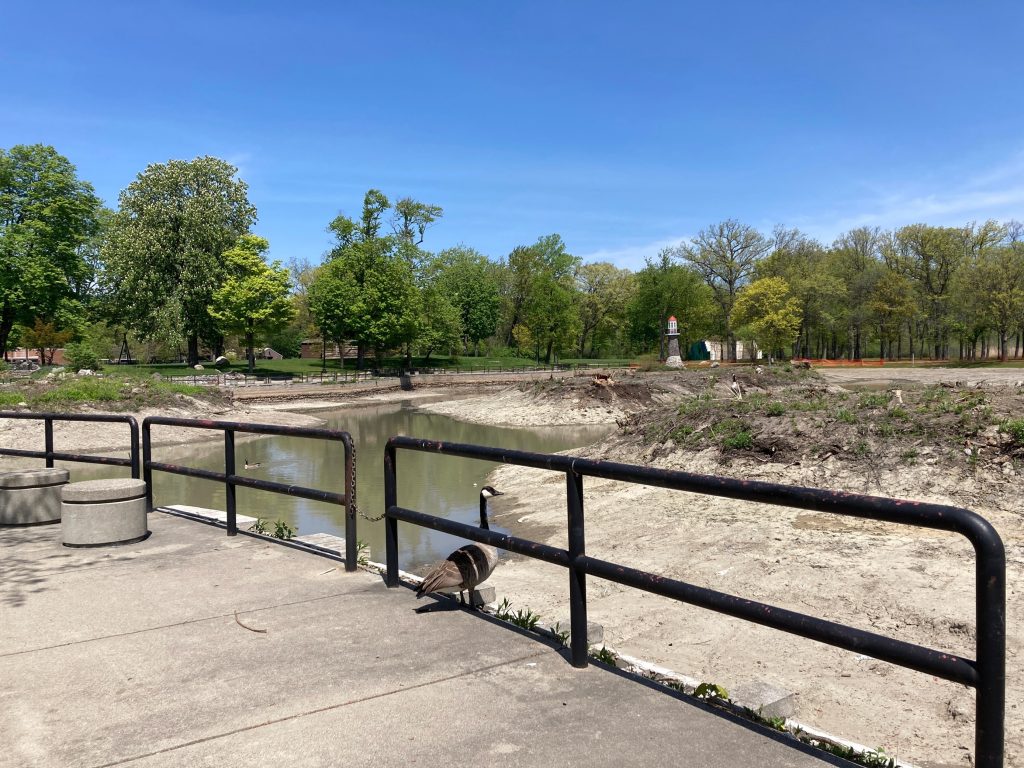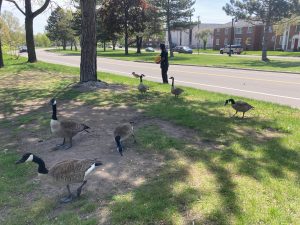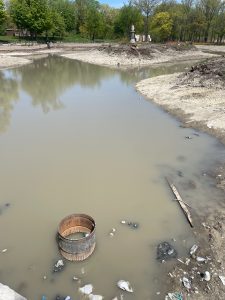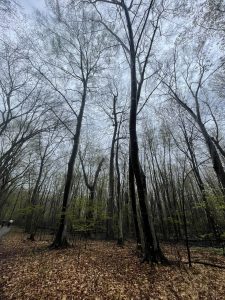Project aims to restore wildlife habitats at Palmer Park
The project includes draining the park’s contaminated lake, protecting the old-growth forest and providing better educational signage throughout the park.

Drained Lake Frances at Palmer Park
Along Woodward Avenue, just north of Six Mile, stands Palmer Park. The greenspace is the second largest City of Detroit-run park and includes walking paths, gardens, a small lake and wildlife.
Detroiter Lewis Craine says he walks from his apartment to the park every day to feed the geese he has grown fond of seeing.
“Every time they see me, they run up and get to honking,” says Craine as he feeds about a dozen geese some cereal.

But the park that these geese call home is changing. Their main habitat, Lake Frances, has been drained.
“The lake looks just barren. It’s been dredged. So that means there was a thick layer of organic material that was removed from the lakebed,” says Jeff Klein, the Deputy Chief of Landscape Architecture in the General Services Department for Detroit.
“Up until this project, that lake was very contaminated. So, anything that was living there was not healthy or getting a good environment. We think that a clean lake will provide a much better habitat for animals like turtles and fish and ducks,” says Rochelle Lento, a current board member of People for Palmer Park, a nonprofit group credited with the original idea of the habitat project.

Jeff Klein says the drainage is part of a bigger project currently underway at the park, the Habitat Restoration Project.
“The goal of the project is really to look at the land and see how we can integrate all the benefits of having a more ecologically sustainable landscape.”
“So dredging the lake, cleaning the lake and then trying to rebuild a balanced ecology is the goal. And part of that will be maybe teaching people not to feed the geese,” Klein says.
Feeding the geese hurts more than it helps. Klein says it inhibits their flying, keeps them from getting the correct amount of nutrients and stops their natural migration habits. Signs telling park-goers not to feed the geese are scattered around the once-filled body of water.
The project also includes plans to protect and help preserve the forest behind the lake.
“That’s a 70-acre remnant forest, but it’s not really healthy right now. And so, we will have a framework plan as to how to approach bringing those woods back to health,” Klein says.
Palmer Park has also recently been designated as an old-growth forest by the National Old Growth Forest Network. This means that the trees within the boundaries have been unlogged and undisturbed for more than 100 years.
Rochelle Lento says the news of Palmer Park’s old-growth forests has made the Climate Restoration Project even more important. She says the preservation of Witherell Woods, the virgin forest within the park, is emphasized in the project.

Besides the lake and the forest, other aspects of the project include providing habitats for birds and pollinators, managing storm water from tennis courts, and providing better educational signage throughout the park.
Klein says the work done in Palmer Park will be important for other Detroit-area green spaces.
“We see a lot of the same sort of amenities or elements in our other parks and our hope is to build off of what we learned here, so we can apply the same interactions into the other parks and really build up a sort of a natural area management.”
The dredging of the lake began this February, and the planting and construction will begin this fall.
Trusted, accurate, up-to-date.
WDET strives to make our journalism accessible to everyone. As a public media institution, we maintain our journalistic integrity through independent support from readers like you. If you value WDET as your source of news, music and conversation, please make a gift today.
